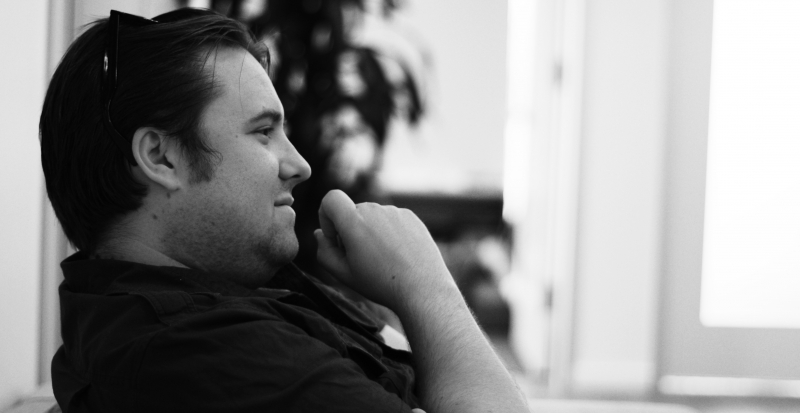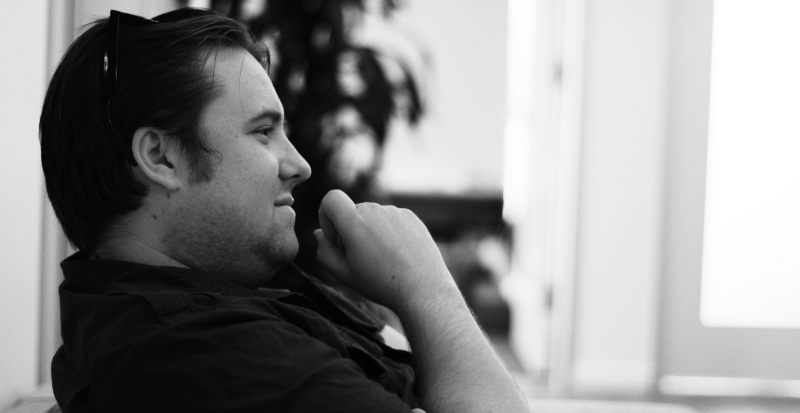Josh Williamson’s Nailbiter: Killer Serial Killer Serial
Community

Josh Williamson ruminates over the origins of serial killers through Nailbiter. Photo:
SLUG: The most recent release introduced us to the—honestly super tragic—school bus driver and his ironically misplaced sense of duty. I felt like that was a really brilliant detail to run with—a character with some completely understandable emotional weight, and one that 99 percent of other properties would just ignore. It really drives home what seems to be your “thesis” here, your questions of what happens to the ones left behind, and we get to see many different reactions to that weight through Alice. Has there been a character so far that’s been the hardest to empathize or connect with emotionally? Has it been difficult altogether getting in the mindset of the “left behind?”
Williamson: Alice has been difficult. Trying to not give too much away and find room for her to have a story. Warren, Finch and Crane have been the easiest to get into, to feel the inside of their heads and see their perspective. But Alice … she really is the human element to the story. It’s her soul that is on the line and doing that in a way that isn’t super overt has been a challenge. The left behinds…? Not really. Mostly because it’s easier to imagine how absolutely horrible it would be to have that happen. To have that kind of guilt.
SLUG: I want to ask about a scene from the first issue where we see former Army interrogator Nicholas Finch, alone in a bedroom, seemingly ready to commit suicide when he is interrupted by a phone call. We’ve had some hints at Finch’s rocky past, but that moment has always stuck with me as sort of “unanswered.” His criminal issues don’t quite seem to satisfy his suicidal tendencies, and he at least cares about Carroll enough to postpone death to help him. Is there something darker on the horizon for readers to discover about Finch, or was that simply him toying with a moment of weakness?
Williamson: Finch has a lot of issues that we’ll build to. Honestly… he isn’t right in the head. His past life really did a number on him and has made him think a lot of dark thoughts. In issue 11, Warren postulates that Finch might have the mind of serial killer, and he’s not that far off. Finch knows that. We’re going to get into spoiler territory here a bit, but Finch realized that not only was he good at hurting people, but he enjoyed it as well. He was taking his own life because he was in a lot of pain and thought he couldn’t be helped. He had no worth. But Carroll’s phone call showed him that he was needed. It’s part of why he is so determined to find Carroll… Carroll’s call saved his life.
SLUG: I think your story and Mike Henderson’s art are a wonderful pairing. Everything is so cinematic. Tell me about your process creating scenes together—is this a joint venture where you begin with an idea and he helps polish? Does he create them alone and come to you for suggestions after?
Williamson: We develop a lot of the look together. I write a full script with some art direction notes and lay out ideas on how we can do some scary scenes, like the first person POV in Issue 2 and the lights flickering in Issue 3. Then Mike runs with it and makes it better than what I imagined. There are some sequences we talk out in advance of me writing if I’m stuck or unsure how to get it down. We’ll go back and forth and then I’ll write it. Just depends on the scene. But Mike is very involved. It’s funny how much of the plot and character beats are figured out via text messages between us. And every few months we get together and chat out the bigger beats.
SLUG: Kelly Sue DeConnick said during Image Expo: “If you’re not tailoring your script to your artist, you’re doing it wrong … It’s not a collaborative comic.” It seems, on its face, a kind of obvious statement, but if it needed pointing out, then perhaps it’s not so obvious. Do you agree with her statement, and if so, how do you establish that kind of relationship with Mr. Henderson?
Williamson: Kelly Sue is dead on correct. There are, sadly, some writers who just write scripts and then walk away—send them off to the editor with no care of what happens next—and there are some editors who try to keep writers and artists apart. It sucks and doesn’t lead to good comics. I got super lucky with Mike. We clicked fairly quickly. But before Nailbiter we did two other projects together. One called Masks and Mobsters and a Ninja Turtles one-shot special. On Masks and Mobsters we were playing around with styles and storytelling techniques, and it helped us develop the short hand and ideas that we now have. We just see comics the same way. The same ideas on how to do the book. I’m more of a Scott McCloud follower and he is more Eisner. So we have our own ideas of things that mesh well. The best way to develop a relationship with your collaborator is to listen. Be equal partners in the process. Communicate and share in the excitement of making an awesome comic.
SLUG: In a previous interview, you talk about how you kept waiting unsuccessfully for someone to offer you the kind of books you wanted to write, and realizing that it wasn’t working and that you should strike out on your own with those ideas. I feel like this is a really important lesson for a lot of creative people, and certainly the success of your work is a testament to that. Can you tell me a bit about how you brought that realization into practice? Has it changed how you plan to approach your work in the future?
Williamson: Whew. That’s tough. It was a lot of frustrations and set backs. I’ve found that I’m a bit hard-headed and stubborn, so it took me some time to figure out what was missing. And it was really right in front of me. You should want to buy your own work. You should be creating art that you’d enjoy if you didn’t make it. I think I learned the lesson the hard way… not that the work was bad or I didn’t like the people I worked with, but that I wasn’t doing it my way. It was more of a mimic of the norm instead of my voice and style. And honestly it hit me when I wrote Ghosted #6. Ghosted #1 though #5 were big for me and helped me established what I liked but when I got to #6 I really knew what I liked writing. I knew my voice and style. It just took those first 5 issues to get there. So being involved in the process of a book and feeling like it was MY take was crucial. I wasn’t just scripting someone else’s ideas. Now I always try to stay true to myself. And that is what I try to keep in my head from this point forward. Holding myself to my own standards.
SLUG: While I couldn’t find any specific confirmation or denial, I assume you’ve got a history writing fiction or novel-length works not meant for graphic novels or comics. If so, how do you discern whether an idea you get is better suited for a “regular” novel or a graphic novel?
Williamson: All comics here. That’s my passion. I’ve never really dived too far into the prose realm. It just isn’t how my mind works. I’ve considered it. But as soon as I start to break it down it falls back into comics. Comics are my medium of choice. I see the comics in my hand as I write them. Sometimes things start to drift into TV or movie land … but again … comics. It’s just who I am.
Issue 10 of Nailbiter drops today at local comic shops like The Nerd Store or Dr. Volts. You can also check it out online at ImageComics.com!






